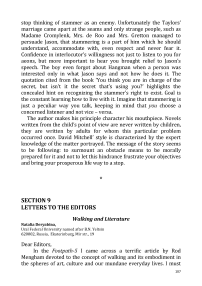Walking and literature
Автор: Deryabina Natalia
Журнал: Тропа. Современная британская литература в российских вузах @footpath
Рубрика: Letters to the editors
Статья в выпуске: 6, 2012 года.
Бесплатный доступ
Короткий адрес: https://sciup.org/147228692
IDR: 147228692
Текст статьи Walking and literature
Natalia Deryabina,
Ural Federal University named after B.N. Yeltsin
620002, Russia, Ekaterinburg, Mir str., 19
Dear Editors,
In the Footpath-5 I came across a terrific article by Rod Mengham devoted to the concept of walking and its embodiment in the spheres of art, culture and our mundane everyday lives. I must admit that I haven't been able to stop pondering it over again and again ever since. The point is that our subconscious intention to reach something 'out there' is basically the purpose of our existence; thus walking could be interpreted as the most symbolic act of a human being.
In terms of literary analysis 'walking' might be indeed a merely more poetical way to refer to hermeneutics, as we, readers, move along the narration trying to grasp the hidden meanings and implications, wander - together with the author - in the tangible yet not always transparent textual reality. Restlessly we cross the plot in long strides, gaining confidence on the way and breathing in sync with the characters... In this respect walking eventually melts into understanding, like when you finally reach the top of the hill and have a chance to observe the path you have taken.
In some of my favourite books the concept of walking is exposed in a very straightforward fashion: for instance, have you read Kazuo Ishiguro's The Unconsoled? Ryder, the main character, can't cease walking because if he does stop, he will fail to return his memory and his own self. It's the same with Franz. Kafka, of course: the idea of wandering is brilliantly unravelled in The Castle. In other books walking becomes a symbolic quest for knowledge and truth, as the characters move along the timeline reaching maturity, obtaining dignity or losing the right track in the end.
For sure walking represents “a ritual significance”. Even in the most obvious physical way it has something magical in it. Why do we follow the icon-bearing procession? Why do we pace in the hall nervously waiting for the exam results? What makes our hearts beat faster during the political march? Perhaps, the core idea hidden in all abovementioned acts is that walking is something we are supposed to do together. No, do not misunderstand me, we all have different paths, and a lot of us would probably choose to walk on our own, but deep inside we just accept this simple fact that we all walk. Walking is universal. Walking binds us together.
However, those philosophical musings are not the only reason why I have written this letter, my dear Readers and Editors. I just wanted you to think about the ultimate appropriateness of the title of this wonderful journal: indeed, a footpath - is all we need. Together we will keep on moving along this road sharing our opinions, presenting our groundbreaking views and simply further exploring contemporary British literature on the way. Good luck to us all then!
*


